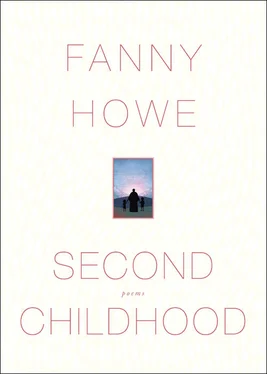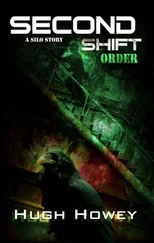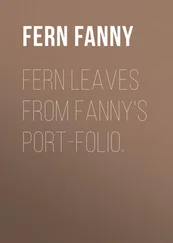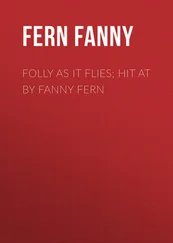Throughout my life I have remained vague and have accepted the humiliation it brought, almost as if stupefaction were a gift. I willfully repeat my mistakes over and over and never learn from experience.
Every day has been a threat to this attitude so I avoid obligations.
For example, last night I dreamed I was on an airplane that was open to the sky and a storm was coming from a hive of stars, and I wanted to sit beside my daughter to watch the wind as we strapped ourselves tight to the invisible seats and stayed awake in the air.
If we had been grown-ups, we wouldn’t have been able to see the stars or the storm. We would have perished.
So my commitment to childhood has once again been affirmed.
Read the signs, not the authorities.
You might think I am just old but I have finally decided to make the decision to never grow up, and remain under my hood.
We are like tiny egos inside a great mountain of air.
Pressed upon by the weight of ether, we can barely breathe.
One ego is like a spider clutched to a web of its own making.
It turns to enamel and hardens on fulfillment.
Many egos fill up the whole body, every part to the tiniest hair.
Some egos are like fingernails that have been stifled by brittle paint.
All egos have something impersonal about them. They live deep inside like viruses and unlike gods who play in outer air.
But this ego covered my face with spider-dust as I lay in my bassinet.
Today I keep seeing gauze of a crystal kind, another kind of web of a type that doesn’t harden but swings and shimmers.
It’s the web-hood of a lost spirit.
At birth a baby failure is unconscious of the shadow that covers her face: it’s from the success leaning over her crèche smudging out the color in her cheeks.
The failure is born to measure the shadow of success. This is the failure’s mission.
The secret hood around her face indicates her vocation.
The success arrives in triumph, and is instantly obsolescent, while the failures keep trying, failing and reproducing until another success is born. It could be centuries from their lifetime.
It’s NOT ironical but logical that the failure is the one who recognizes success and identifies its potential in her enemies.
She it is who keeps their egos alive with her tears.
She is their harshest critic, she who can separate the fraud from the living, the cold from the lukewarm.
She is still a failure, a tiny ego who can’t quite rise to the occasion of being. She is driven by longing.
And she has crazy rules: “If your whole body can’t breathe the air, your prayers are incomplete. No nail polish!”
I think the gods and goddesses were the last good grown-ups on earth. Once I saw them walking to a party along a beach and I could make out their shadows like a line of pines in an ocean breeze. They were laughing and calling to each other. Still they were always aware of their mortal children’s prayers and answered them, sometimes in the form of mist, sometimes with needles of sunlight.
The gods existed outside the ego-world though they were certainly jealous and angry. Now some of them are pots and pans and wax and marbles, balls and kettles, rope and puddles. They emit a crackling sound when lightning hits the ground, and give people shingles. Other gods have chosen to break out to heaven where they blend into pastel and ride comets once a year. Sometimes it’s hard to walk with so many gods bouncing around so I use a broom, rosary or cane to wave them away.
I have never arrived
into a new life yet.
Have you?
Do you find the squeak
of boots on snow
excruciating?
Have you heard people
say, It wasn’t me,
when they accomplished
a great feat?
I have, often.
But rarely.
Possibility
is one of the elements.
It keeps things going.
The ferry
with its ratty engine
and exactitude at chugging
into blocks and chains.
Returning as ever
to mother’s house
under a salty rain.
Slave up, slave down.
I want to leave this place
a postulant.
The gas stove is leaking
and the door of the refrigerator
stained with rust.
The mugs are ugly
and there are only two forks.
The walls are black
and soft, the bed a balloon
of night-clothing.
The stairwell sloped
to a dragger’s pace.
There are big windows
with blind-slats dusty
and gray. Street life
goes all night and at dawn
freedmen shout and
laugh outside the kitchen.
Where does life begin?
In the lamb or in its threads?
If a man is numb
beat him.
If mute, shout
Say my name!
If he’s still wearing
that coat, scream
Mercy, mercy!
and stroke it.
We drop the shadows where they are then
return to them
when the light has grown heavy.
You’ll take your time lugging the weight into our room
or stand over there in the shade.
We’ve never been too sure that we exist as the earth does.
We’re most at home in water
that soaks up the letters in our brains.
It could be we’ve been dry too long.
A spirit is a mess when excess spoils it.
I see them through the slats
and crack of the open window.
A cold rain. Leaves flipped
and palsied.
The river is brown near
the sand, loose banks and twigs
stick at the edge and a lilac’s
silhouette of a dog.
How in the dark hole can I hide
if I can’t get outside?
Then I won’t remember
what I did to deserve it.
That arch and bridge
will form a shape of repentance.
If I’m hanging,
then judgment has been passed.
And I am hanging
upside-down
head swinging towards the moon.
Years of inversion.
A face in a mirror displaced
by its position outside silver.
And so?
Next will come muscle,
a little grief but no shoulder.
You’re learning how to be a unit
with an infinite in its attic.
It’s not difficult.
Light is the last message.
Then white streaks like oil paint
are the first to appear along the wet railing.
The ghost was soaked
and swelled into a human being
so close to resurrection
I could see the genius
of institutional religion.
Examine your conscience
until you are a postulant
who has only one sin to offer God.
Soon you’ll wash that thing off
(scented by its parallel past) and pause.
What were your feet thinking in their hurry
to connect the parts?
Get the children to the other side!
What children? You were the one running.
There was never any other.
Now the sun is like a yolk that broke
into the corridor.
Sleepwalk through its gold
and you will see the original glitter
that lit our move to the lounge.
“I’m looking for a restaurant
with a baby spoon and knife.”
“May I consult my psychic?”
A long shadow will mean your back’s to the sun
and you can’t empty the space you occupy anymore
expecting to see another opening.
The moods of strangers
determine your day.
Will the driver be kind?
Please God let him be.
This is poverty, not just
second childhood
in a divided city.
But my thanks to the soul-heat
of the one who works the register
and shakes the bag.
Infinite nesting pushes all matter
towards emptiness:
child-nodes,
tree-droppings
with a root element of null.
None is always included
in every cluster
Читать дальше












